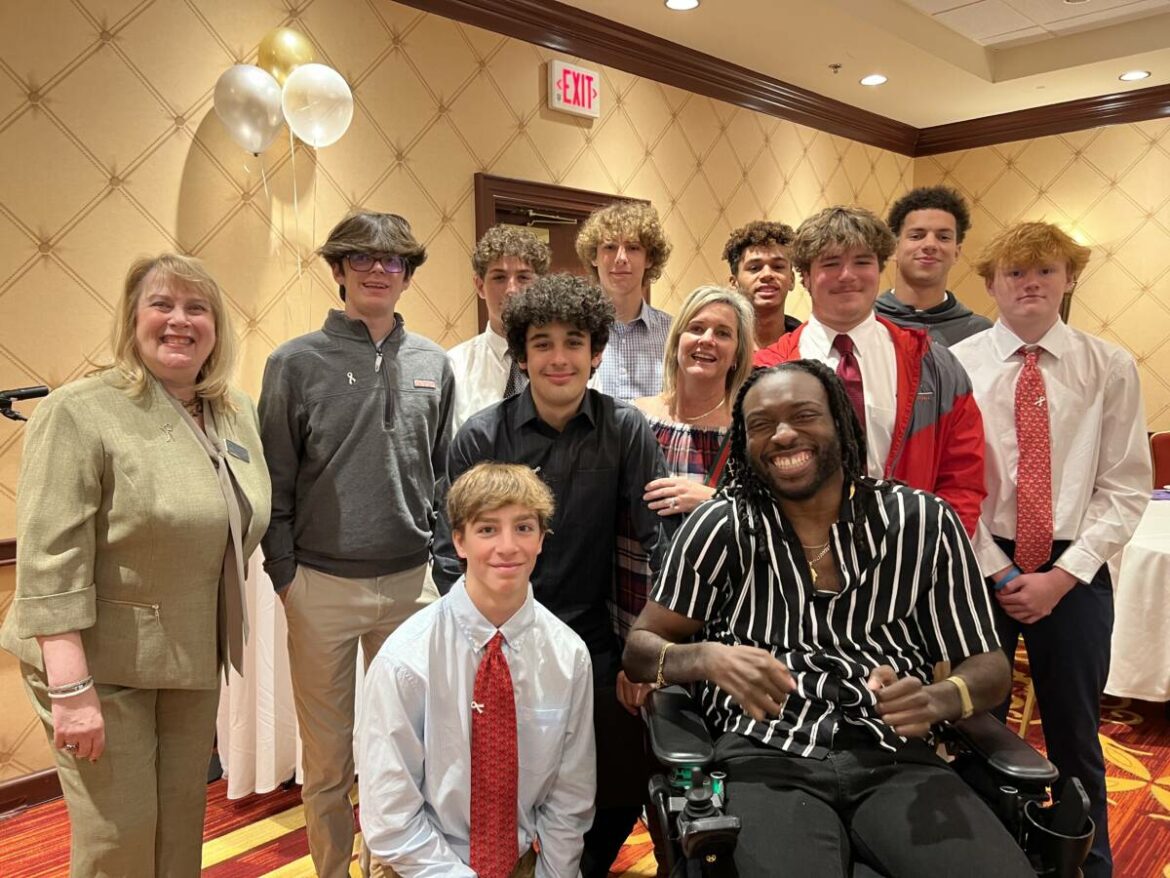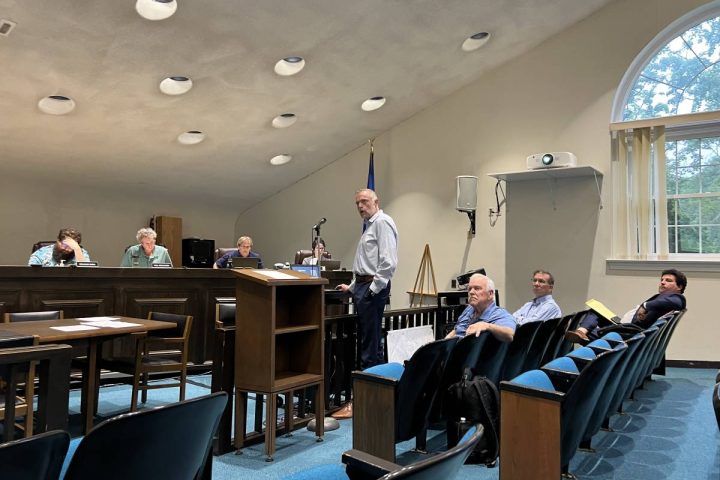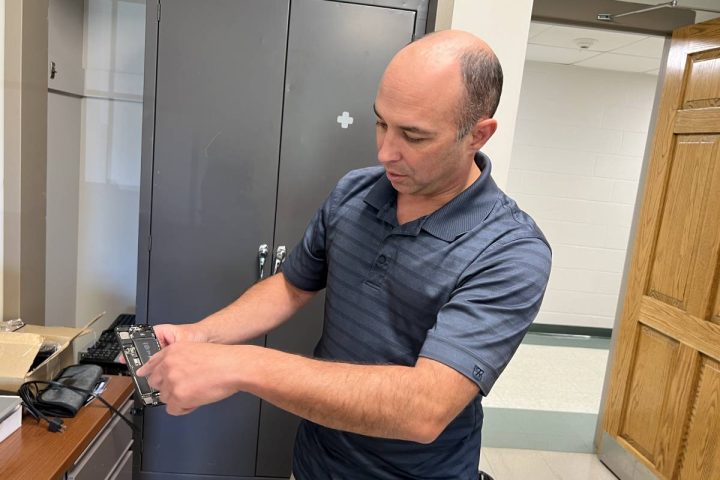TRUMBULL, CT — Thirteen years ago, Emeka Nnaka was an athletic, 21-year-old defensive end for the Oklahoma Thunder, a semi-pro football team, standing at 6’5 and weighing an imposing 250 pounds.
During a game at Fayetteville, Ark., Nnaka shed a block and ran through another before taking down the kick returner with a crunching tackle.
“I knew something didn’t feel right,” Nnaka recalled. “I made this tackle in a big stadium and it was quiet. You know the tingling you feel when you hit your funny bone? It was my whole body.”
“I saw teammates on one knee and realized it was for me,” he continued. “I tried to get up and I couldn’t. They wheeled me to an ambulance and I tried to give a thumbs up to show the kids I was okay and I couldn’t. I wondered if I would be okay.”
Nnaka became paralyzed from the chest down, but that’s not where his story ends.
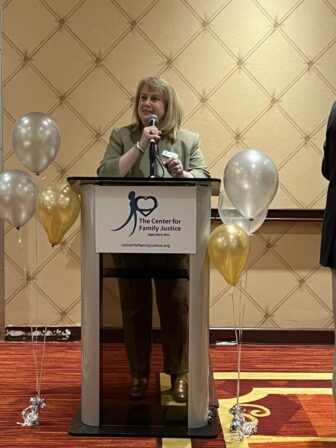
Nnaka, the keynote speaker for The Center for Family Justice’s annual Speaking with Men breakfast, held at the Trumbull Marriott Shelton Thursday morning, shared the inspirational story of lifting himself out of a dark place, earning his education, becoming a motivational speaker, and founding Live Beyond Labels.
The Center for Family Justice’s White Ribbon Campaign’s steering committee organized the fourth annual Speaking with Men breakfast.
“It’s sold out,” Deborah A. Greenwood, president and CEO of CFJ, said from the podium, “and we’re gonna have an even bigger room next year.”
Greenwood said CFJ offers free and confidential support for those affected by domestic violence, sexual violence and child abuse, as well as promoting awareness.
“The White Ribbon Campaign is a group of dedicated men who stand up for women and girls,” she said.
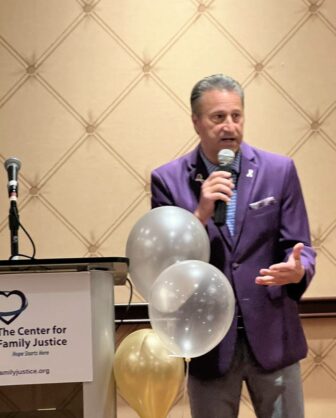
Gary MacNamara, former police chief for the town of Fairfield and current chief/executive director of Public Safety & Government Affairs at Sacred Heart University, is chairman of the White Ribbon Campaign’s steering committee.
MacNamara said, “the whole point of the White Ribbon Campaign and all we do for The Center for Family Justice is to make a difference, and I can assure you that we will all be better when we go back to our cars today, because we’re all gathered together to make a difference.”
“This, by far is one of my proudest moments — when I walked in here and saw so many young people in this room,” said Matthew Reale, chairman of CFJ’s board of directors. “This is what Gary and I wanted when we started the White Ribbon Campaign.”
Reale told the young men at the breakfast they have an opportunity to make positive change and to be a difference in people’s lives.
Outside the ‘man box’
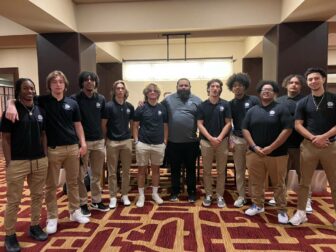
Among the young people in the room were members of the Bunnell High School football team, who arrived with their head coach, Ty Jenkins. Jenkins was honored with a Community Leader Award for serving as a positive role model.
In March of 2022, the coach held a workshop for football players and members of the boys basketball team to discuss several topics, including the treatment of women, consent, nonviolence and respect.
“In early 2022, I saw a need in our building for intervention,” Jenkins said. “I contacted The Center for Family Justice for guidance and had a mandatory workshop with over 100 kids. They came focused and left inspired.”
“It actually, kind of changed the culture of our team,” Jenkins told The Sun earlier.
He said they talk about “the man box”, to symbolize the behaviors that are expected of males, such as not showing emotion. His players learned the lessons of kindness and respect, “the little things” they take with them beyond the football field.
“I hope they become good husbands and good fathers,” Jenkins said.
The Bunnell football team’s last game is against its rival, Stratford High School. Jenkins said it will be their White Ribbon game.
Finding a new purpose
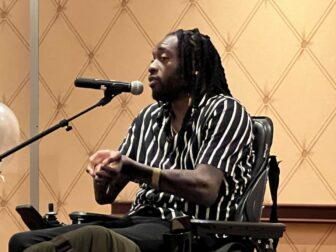
Malachi Thomas, a counselor for Camp Hope, which helps children and teen survivors of trauma, introduced Emeka Nnaka as the keynote speaker.
Nnaka has been featured on NPR’s “All Things Considered” and his story has also been featured in the national media, including The Mighty, The Washington Post and TED Talks.
He was recognized for his resilience through life’s challenges and service to the community in interviews on the “Ellen DeGeneres Show” where he’s been featured as a returning guest.
But before his recent success, Nnaka had to get through a dark period after his paralyzing injury, a time he said lasted for about three years.
Nnaka is from Georgia, but now lives in Tulsa, Okla. After Thomas introduced him Thursday, Nnaka moved to the front of the room in a motorized wheelchair.
After high school he went to Oral Roberts University, where he said he wanted to make a difference and make his parents proud, just like any other 17-year-old.
“Academia was not my thing,” Nnaka admitted. “I failed a lot. I racked up some expensive Fs. Then I transferred to a community college for cheaper Fs. I joined a football team. That was my gift, the thing I would use to get out of this academic rut and make my parents proud. I played and won a championship.”
But then he suffered the horrific, life-changing injury in Arkansas. Nnaka remembers his mindset going into rehabilitation.
“My main thing was, I was going to go back to playing football and living my life,” he recalled. “It didn’t happen. It was the darkest time. Losing my athletic ability, it was triple darkness.”
His condition also affected him socially and spiritually. “My light was gone,” Nnaka said. “What do I do?”
Nnaka told the young people in the audience how you can have a plan only for life to crumple it up, throw it back and say, “deal with that.”
He said he enjoyed working with kids and volunteered helping local youth as a way to get out of the house.
“My service, early on, was me trying to escape my internal demons, but something happened,” Nnaka said. “I thought, ‘I will help children and impart something good,’ but they gave me hope. They gave me a reason to get out of bed.”
He spoke of the importance of motivation and noted how children are seen as the future, as hope for a better tomorrow. “We sometimes forget that children can look at us and see the same things,” Nnaka said.
In his depression, Nnaka said he thought of no longer being able to run, lift weights … do the things he thought made him a man. When everything was torn down, Nnaka said he decided to “build something better back up.”
“I decided I’m going to do the work, read the books and not be a product of my environment,” he said. “I want to live beyond the labels of my circumstance.”
Nnaka said he was also determined to help others do the same.
What makes a man
Through his motivational speaking, Nnaka preached the importance of teenage boys treating girls with respect. Then a woman from his past sent him a direct message asking how he could say this after the attitudes he expressed toward women in college.
“She was absolutely right,” Nnaka said. “I’m an imperfect ally to say the least.”
Nnaka told the woman she was right, how he wants to be a better person, and asked her to continue to hold him accountable. A time later, she told Nnaka she saw that he had truly changed.
He said everyone falls down in life, but no matter how many times you fall, the most important thing is to keep getting back up and fighting.
“I wouldn’t be here today if I didn’t make these choices,” Nnaka said. “I don’t hold it against anyone who chooses not to get back up. Life is hard. But I want to be able to say, ‘you can do this.’ I want to be the one who can inspire them to get back up.”
During an interview after Nnaka’s talk, MacNamara asked what truly makes him a man.
After a long pause, Nnaka said it’s avoiding toxic masculinity and that it is okay to say, “I love you.”
“I love hugs,” he said. “I hug my friends. I look them in the eye and say, ‘I love you man.’ I don’t want to be the man who’s threatened by being human. It’s okay to express your emotions and to have your emotions.”
Sponsors of Speaking with Men were the Masarek Family Foundation, the Trumbull Rotary Interact Club and the Fairfield County Community Foundation.

